-
-
- Advancement of the Professions Committee
- Standards Committee
- Audit and Risk Committee
- Education Committee
- Disciplinary Committee
- Charter Case Committee
- Preliminary Investigation Committee and Disciplinary Committee Liaison Committee
- Registration Committee
- Preliminary Investigation Committee
- Paper classification: some definitions
-
-
-
-
- About extra-mural studies (EMS)
- EMS requirements
- Information for vet students
- Information for EMS providers
- Information for vet schools
- Temporary EMS requirements
- Practice by students - regulations
- Health and safety on EMS placements
- EMS contacts and further guidance
- Extra-mural studies fit for the future
-
-
- Code of Professional Conduct for Veterinary Surgeons
- Code of Professional Conduct for Veterinary Nurses
- Contact the Advice Team
- XL Bully dog ban
- 'Under care' - guidance
- Advice on Schedule 3
- Controlled Drugs Guidance – A to Z
- Dealing with Difficult Situations webinar recordings
- FAQs – Common medicines pitfalls
- FAQs – Routine veterinary practice and clinical veterinary research
- FAQs – Advertising of practice names
- GDPR – RCVS information and Q&As
-
- Accrediting veterinary degrees
- Accrediting veterinary nursing qualifications
- Reasonable adjustments for student vets
- Health and disability in veterinary medicine study and practice
- The role of the veterinary schools and the RCVS
- Reasonable adjustments and the Equality Act 2010
- Reasonable adjustments and Day One Competences
- Examples of reasonable adjustments for vet students
- Annex
- Reasonable adjustments for student vets - summary
- Reasonable adjustments for student veterinary nurses
- Health and disability in veterinary nurse education and training
- Reasonable adjustments for students and the UK disability discrimination legislation
- Educational assessment of veterinary nurses
- Roles of key stakeholders in the application of reasonable adjustments
- Examples of reasonable adjustments for vet nurse students
- Embracing reasonable adjustments for student vet nurses - summary
- External review of the RCVS by ENQA
- Requirements for remote and online student assessments
About this plan
True to our strategic aims, this plan has benefitted from extensive collaboration with, and feedback from, our stakeholder groups, and takes into account findings from surveys and discussion groups.
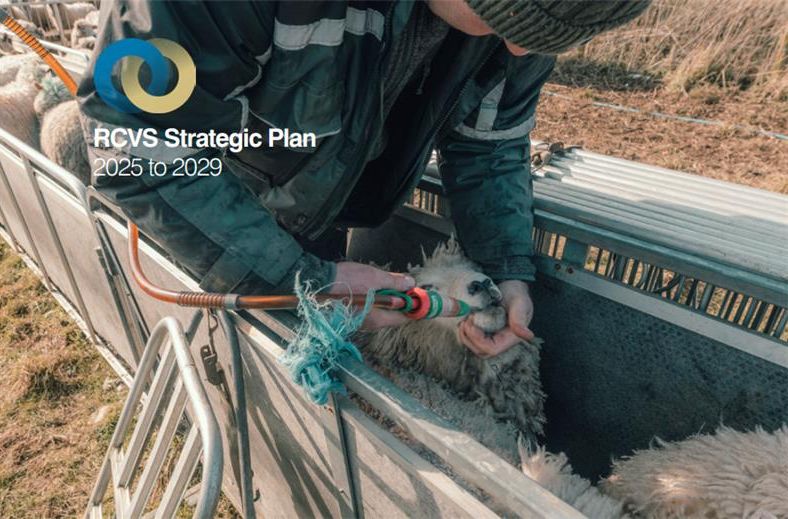
On this page
Each of the following four sections focuses on our work with, and anticipated impact on, a different internal or external stakeholder group, namely:
A. Veterinary professionals
B. Animal owners and keepers
C. Society at large
D. Our staff team and governance
In each section, you will find our strategic ambitions and some proposed aims.
What we actually do over the next five years will also be informed by changes in the world around us, feedback from stakeholders, our resources and the political landscape.
But regardless of the specific actions, two clear threads will run throughout our work: we do the right thing; and we do things right.
We do the right thing
Animal health and welfare is precious, and the veterinary team are its custodians.
Our role is to support them to do the right thing – and in doing so, we must also do the right thing.
We take a leadership role, strive to advance and push for the legal underpinning that we need, via new legislation.
We demonstrate our impact, are risk-informed and relevant. We are fair and expect fairness in return.
We do things right
To support this, we must work effectively and efficiently.
We seek a strong evidence base for decisions, bring our stakeholders with us to ensure we can deliver, and are transparent in our process and decision making.
We must ensure we are on a sound financial footing, with appropriate resources and skills. We constantly learn. We prioritise the protection of our data, while sharing our knowledge.
Timeframe
This plan is for a five-year period and will be underpinned by regularly updated operational plans that outline our activities in more detail, with timeframes, impact measurements and resource requirements.
Our staff, committees and working groups will contribute to these plans, to ensure they remain relevant and achievable.
As ever, any major changes emanating from this work will go to consultation with our stakeholders, both professional and public.
Our framework for strategic change will be agile enough to respond to the changing landscape, for example, the outcome of the Competition and Markets Authority investigation (due by end of 2025) and our ongoing push for new veterinary legislation.
A. Stronger together with veterinary professionals
Ambition:
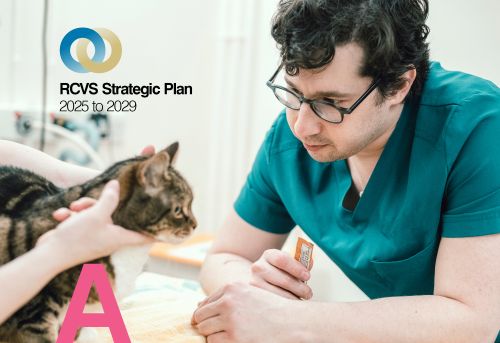 We will support veterinary professionals to succeed in meeting high standards in their chosen careers. We will champion accessible, team-based veterinary care, delivered in settings that support professional autonomy and leadership.
We will support veterinary professionals to succeed in meeting high standards in their chosen careers. We will champion accessible, team-based veterinary care, delivered in settings that support professional autonomy and leadership.
Our aims will include, but not be limited to:
- Achieving new veterinary legislation, including team-based veterinary care and practice regulation.
- Improving the way in which we use data to improve monitoring and enforcement of veterinary standards.
- Reviewing the Codes of Professional Conduct and supporting guidance, and how they are understood, complied with and enforced.
- Working, through Mind Matters and other initiatives, to achieve a veterinary workforce that meets demand, and an inclusive culture in which professionals can thrive, without fear of discrimination or harassment.
- Supporting veterinary professionals’ appropriate use of artificial intelligence and other new technologies, to optimise positive impact, support growth and mitigate any risks.
- Ensuring our educational standards and career pathways meet the diverse needs of society and the professions.
- Supporting and engaging with veterinary and veterinary nursing students to help them better understand the role of the College and their responsibilities as future veterinary professionals.
B. Stronger together with animal owners and keepers
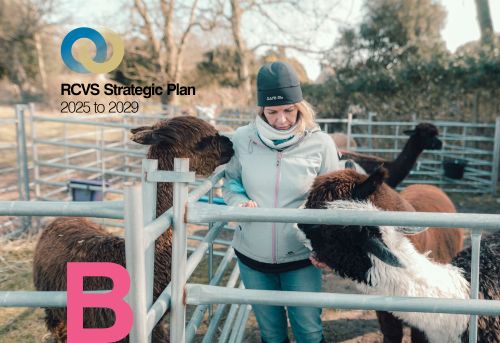 Ambition:
Ambition:
We will support animal health and welfare and public health by enabling access to veterinary care that is informed by the needs of consumers and service users.
Our aims will include, but not be limited to:
- Achieving new legislation that enables us to better meet the needs of users of veterinary services.
- Forging trust between the veterinary professions, the College and animal owners and keepers, and supporting their needs.
- Supporting and informing service users in order to get the best from veterinary professionals, with increased transparency, agency and choice.
- Considering ways in which those accessing veterinary care could be better supported, by better understanding the human-animal bond and the role of animals in society; for example, exploring the role of pet bereavement counselling as part of our complaint resolution process, or the veterinary social work concept.
- Taking regular feedback and working to improve our services and communications to animal owners and keepers
C. Stronger together with society at large
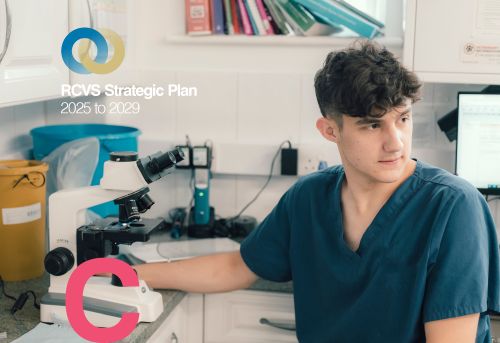 Ambition:
Ambition:
We will champion the role that veterinary professionals play in One Health and public health, take a leadership role on environmental sustainability and biodiversity, and continue to look beyond our domestic horizons to have a positive impact upon the world around us.
Our aims will include, but not be limited to:
- Collaborating and holding space for conversation on challenging issues, such as the role of animals in society, the responsibilities of animal owners/keepers, and the cost of veterinary care.
- Articulating the contribution of veterinary professionals, and interrogating the evolving rights and responsibilities of professionals in today’s society.
- Championing the veterinary role in One Health, by ensuring the veterinary voice is heard and that the next generation of veterinary professionals are equipped to contribute.
- Ensuring that veterinary professionals specifically responsible for public health are well supported with robust standards and safeguards.
- Lighting a fire of enthusiasm for veterinary work in the minds of the next generation of potential professionals, so we continue to better reflect the society that we serve.
- Building the College’s reputation overseas and investigating opportunities to scale and supply relevant initiatives and services, in the interests of animal health and welfare.
- Engaging with the local community around Hardwick Street.
D. Stronger together with our staff team and governance
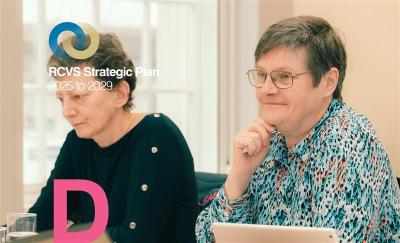 Ambition:
Ambition:
We will attract and retain the diversity of talent and skills to deliver what’s needed now and anticipate what might be next, building a culture that allows people to thrive, whether staff, Council or other contributors to our purpose.
Our aims will include, but not be limited to:
- Achieving new legislation that allows for the right skills and structure for effective governance.
- Developing an infrastructure for success, including our new headquarters, and underpinning structures for finance, communications and digital.
- Planning for success and for succession, including a workplace review.
- Empowering our staff team to deliver confidently on the College’s purpose, via competency frameworks and clarity of expectation.
- Creating a working culture with sound values and supportive management, and enabling and supporting our teams to live up to those values.
- Providing a working environment that is inclusive, supportive and respectful, to develop everyone’s unique strengths, and with zero tolerance for harassment and abuse.
- Horizon scanning, and bringing the outside in, via research, collaboration and experience.
- Taking regular feedback across all our areas of work to ensure ongoing quality improvement.
Stronger together, with animal health and welfare at our heart.
Download the RCVS Strategic Plan 2025-2029 as a PDF